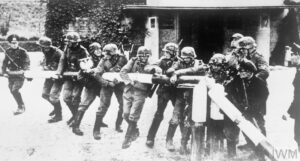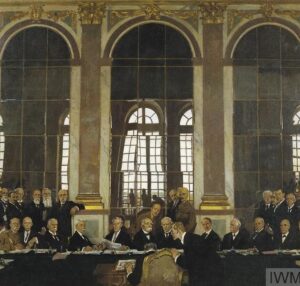Forgotten Friday – 1st September 1939
This forgotten Friday we are delving into the start of the Second World War – The war began when Nazi Germany invaded Poland on 1st September 1939 and raged across the whole globe until 1945.
Germany invaded Poland to regain lost territory from the consequences of the Treaty of Versailles in 1919. The German invasion of Poland was a primer on how Hitler intended to wage war–what would become the “Blitzkrieg” strategy.

THE GERMAN-SOVIET INVASION OF POLAND, 1939 (HU 56131) German troops breaking the border barrier in the Polish town of Sopot (Zoppot) on the morning of 1 September 1939. The Soviet invasion would follow on 17 September. Copyright: © IWM. Original Source: http://www.iwm.org.uk/collections/item/object/205088021
Germany’s Blitzkrieg approach was characterised by heavy bombing early on to destroy the enemy’s air capacity, railroads, communication lines and munitions dumps. This was followed by a massive land invasion with overwhelming numbers of troops, tanks and artillery. After the German forces had ploughed their way through, devastating a swath of territory, infantry moved in, picking off any remaining resistance.
Once Hitler had a base of operations within the target country, he immediately began setting up “security” forces to annihilate all enemies of his Nazi ideology, whether racial, religious, or political. Concentration camps for slave labourers and the extermination of civilians went together, with German rule of a conquered nation. For example, within one day of the German invasion of Poland, Hitler was already setting up SS “Death’s Head” regiments to terrorise the populace.

The signing of the Treaty of Versailles, depicted in a painting by William Orpen. – (c) IWM Art.IWM ART 2856
The Polish army made several severe strategic miscalculations early on. Although 1 million strong, the Polish forces were severely under-equipped and attempted to take the Germans head-on, rather than falling back to more natural defensive positions.
The outmoded thinking of the Polish commanders coupled with the antiquated state of its military were simply no match for the overwhelming and modern-mechanized German forces. And, of course, any hope the Poles might have had of a Soviet counter-response was dashed with the signing of the Ribbentrop-Molotov Nonaggression Pact.
Great Britain would respond with bombing raids over Germany three days later, and it was announced by the Prime Minister on 3rd September 1939 that Britain was at war with Germany.

